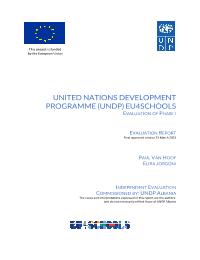
Project Evaluation – EU4Schools
The “EU4Schools” Programme is part of the European Union’s financial commitment made during the International Donor’s Conference, organized in Brussels on February 17, 2020, to support the post-earthquake reconstruction efforts following the earthquake that struck Albania on 26 November 2019. In April 2020 the EU and UNDP signed a contribution agreement to implement the EU4Schools programme by UNDP Albania. The EU contributed €15,000,000 to the first phase of the programme, while UNDP contributed another €115,000. The original programme duration was foreseen to be 18 months which has initially been extended to 32 months and subsequently to 39 months. The end date of the programme is 30 June 2023. The EU and UNDP have signed an agreement for a second phase of the EU4Schools programme (€60 million), which is not part of this evaluation. Together with the € 15 million for Phase II, the EU has allocated in total €75 million for the reconstruction of the education sector in the eleven municipalities most affected by the earthquake.
The overall objective of EU4Schools Phase I is to support national and local governments in reducing further social and economic losses and to accelerate the recovery process through educational facility repairs and reconstruction. The EU4Schools Phase I targeted five affected municipalities, namely: (i) Durrës, (ii) Kavaje, (iii) Kruje, (iv) Kamez and (v) Kurbin. The programme focused on reconstruction and repairing an estimated 22 educational facilities, including kindergarten, primary (or 9-year) schools and secondary schools, from which indicatively 11 would be repaired and 11 reconstructed.
The evaluation assessed all aspects of the programme interventions, outcome and output results and its allocated resources in relation to the programme’s results. This was done through the implementation of a mix-methods approach across all the six OECD/DAC Evaluation criteria Relevance, Coherence, Impact, Effectiveness, Efficiency and Sustainability. In addition, particular attention was paid to the following cross cutting issues such as gender mainstreaming and equal opportunities, accessibility, human rights, environment, and waste management, as well as to communication and visibility dimensions. The evaluation assessed the extent to which the planned specific objective/outcome and results/outputs have been achieved since the beginning of the programme and the likelihood of their full achievement by the end of the programme in November 2022 (based on the Programme Document/Description of the Action and its results’ framework). The evaluation looked into the overall programme performance and results, covering all education
Output 3.3 Risk informed and gender-responsive recovery solutions, including stabilization efforts and mine action, implemented at regional, national and sub-national levels
Goal 1. End poverty in all its forms everywhere
Goal 4. Ensure inclusive and equitable quality education and promote lifelong learning opportunities for all
1.3 Implement nationally appropriate social protection systems and measures for all, including floors, and by 2030 achieve substantial coverage of the poor and the vulnerable
4.a Build and upgrade education facilities that are child, disability and gender sensitive and provide safe, non-violent, inclusive and effective learning environments for all
1: Poverty


